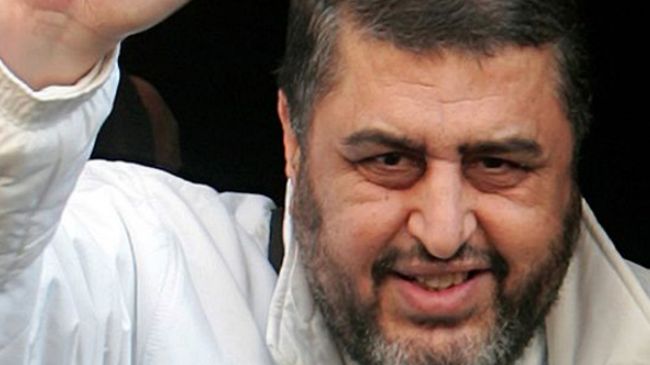LATEST: Tunisia — Ennadha Leader Ghannouchi Accepts Referendum, But Says PM & Assembly Must Stay
In the continuing effort for a political resolution between the leaders of Egypt’s coup and the supporters of deposed President Mohamed Morsi, diplomats from the Gulf, the European Union, and the US have met the imprisoned deputy leader of the Muslim Brotherhood, Khairat El-Shater (pictured in file photo).
Sources said El-Shater refused to negotiate with the envoys — the foreign ministers of Qatar and the United Arab Emirates, US Deputy Secretary of State William Burns, and the European Union representative to the Middle East — insisting that the delegation meet with Morsi.
El-Shater, a prominent businessman as well as political leader, faces charges of inciting killings during mass just before the July 3 coup.
In the past week, the European Union’s foreign policy chief, Catherine Ashton, has seen both the head of Egypt’s military, Abdel Fattah El-Sissi, and Morsi. US diplmat Burns is on his second trip to Cairo since the coup, discussing the situation with the interim Government and military leaders.
US Senators John McCain and Lindsey Graham are due to arrive in Cairo on Monday.
To that end, US senators John McCain and Lindsey Graham are due to arrive in Cairo on Monday as diplomatic efforts to end the country’s political crisis intensify.
Latest Updates, From Top to Bottom
Tunisia: Ennadha Leader Ghannouchi Accepts Referendum, But Says PM & Assembly Must Stay
The head of the Ennadha Party — the leading faction in the ruling coalition — has said it will accept a referendum over whether to preserve institutions for a transition in governance, but he stood firm against opposition efforts to remove the Prime Ninister or dissolve the Constituent Assembly.
The Assembly has almost completed a draft Constitution and electoral law.
Rached Ghannouchi said, “If they are insistent on terminating the transitional process, we say to them, come, let’s have a popular referendum. They raised their demands so high and now they’re stuck in a tree.”
Protests have flared since the assassination last month of leftist political leader Mohammed Brahmi.
Egypt: Foreign Reserves Recover with Gulf Aid
Egypt’s foreign currency reserves have recovered from their critical low point to $18.9 billion at the end of July after an influx of aid from Gulf States.
Saudi Arabia, Kuwait, and the UAE pledged $12 billion in assistance within days of the overthrow of President Morsi by the military on July 3.
Finance Minister Ahmed Galal announced last week that $3 billion of the pledged money would be earmarked towards the State’s fiscal budget and $9 billion would bolster foreign reserves. The Central Bank confirmed receipt of a total of $5 billion in aid from the UAE and Saudi Arabia to date.
Foreign reserves fell to $14.9 billion in June, covering less than three months of essential imports.
Lebanon: Syrian Chopper Fires At Lebanese Target
Syrian army chopper on Monday fired at least three rockets at Khirbet Daoud in northeast Lebanon.
Anonymous Lebanese security sources told The Daily Star that an illegal border crossing in the area was the target of the attack. There were no casualties.
Turkey: Court Hands Down Life Sentences in “Ergenekon” Coup Trial
An Istanbul court has handed down life sentences to some of the 275 defendants accused in the “Ergenekon” coup case.
Turkey’s former Chief of General Staff İlker Başbuğ, journalist Tuncay Özkan, retired generals Hasan Iğsız, Nusret Taşdelen, Hurşit Tolon, Hasan Ataman Yıldırım and Veli Küçük, retired colonels Fuat Selvi and Fikri Karadağ, lawyer Kemal Kerinçsiz, Workers’ Party leader Doğu Perinçek were among those given aggravated life sentences.
Other military and political leaders received long prison terms.
Twenty-one suspects have been acquitted so far.
The case began in 2007 with the discovery of 27 hand grenades in a house in Istanbul and subsequently drew in much of Turkey’s political and military elite as suspects.
Israel: Government Expands List of Settlement for “National Priority Funding”
The Israeli Government has confirmed 91 Jewish settlements in the West Bank on a national priority funding list.
The list added nine new sites and dropped three from the list.
The “list of settlements with national priority” is a long-standing roster of nearly 700 border towns and settlements eligible for extra development funding above and beyond their normal budgets.
Most communities on the list are either on Israel’s northern border with Lebanon or to the south, across from Egypt.
“We condemn this step,” Nabil Abu Rdainah, spokesman for Palestinian Authority President Mahmoud Abbas, said. He accused Israel of seeking to “put obstacles in the way of U.S.-backed efforts” for an Israeli-Palestinian agreement.

